In the fast-paced world of hospitality, staying ahead means more than just offering comfortable accommodations and great service. It's about seamlessly integrating technology to streamline operations and enhance guest experiences. One such technological marvel making waves in the hotel industry is API integration.
Understanding Hotel API Integration
API (Application Programming Interface) integration involves connecting different software systems to communicate and share data effectively. In the context of the hotel industry, API integration allows hotels to connect their booking systems, property management systems (PMS), and other software with third-party applications and services.
Streamlining Booking Processes
Gone are the days of manual booking processes that were prone to errors and delays. With hotel API integration, properties can synchronize their booking engines with various online travel agencies (OTAs), global distribution systems (GDS), and metasearch engines in real-time.
This synchronization ensures that room availability, rates, and booking information are updated across all platforms instantly. It eliminates the risk of double bookings, enhances revenue management capabilities, and expands the hotel's reach to a wider audience of potential guests.
Enhancing Guest Experience
In today's digital age, guests expect convenience and personalization at every touchpoint of their journey. Hotel API integration empowers properties to meet these expectations by offering a range of guest-centric services:
- Mobile Check-in and Check-out: Integration with mobile apps enables guests to check-in and check-out seamlessly, minimizing wait times and enhancing convenience.
- Personalized Recommendations: By leveraging guest data from integrated systems, hotels can offer personalized recommendations for dining, activities, and amenities tailored to individual preferences.
- Automated Communication: APIs enable automated communication with guests through email or SMS, providing pre-arrival information, room upgrade offers, and post-stay feedback requests.
Optimizing Operational Efficiency
Efficient operations are the backbone of any successful hotel. API integration streamlines internal processes, reduces manual tasks, and improves staff productivity:
- Centralized Data Management: Integration with PMS and other systems centralizes data management, allowing staff to access real-time information on bookings, guest preferences, and inventory levels.
- Inventory Management: Integration with distribution channels automates inventory management, ensuring optimal room allocation and maximizing revenue potential.
- Seamless Payment Processing: Integrated payment gateways facilitate secure and hassle-free transactions, enhancing the guest experience while minimizing the risk of payment errors.
Embracing the Future of Hospitality
As the hospitality landscape continues to evolve, embracing technology-driven solutions like hotel API integration is no longer a choice but a necessity. It empowers hotels to stay agile, adapt to changing market dynamics, and deliver exceptional experiences that keep guests coming back.
In conclusion, hotel API integration serves as a catalyst for innovation, efficiency, and guest satisfaction. By leveraging the power of interconnected systems, hotels can unlock new opportunities for growth, differentiation, and success in the competitive hospitality industry.







